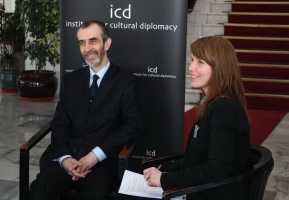Difference between revisions of "H.E. Amb. Dr. Milan Jazbec"
| Line 4: | Line 4: | ||
[[File:Jazbec.jpg|400x200px|thumbnail|left]] | [[File:Jazbec.jpg|400x200px|thumbnail|left]] | ||
| − | Culture is a universal concept. I would not imagine any peace building and conflict resolution result without using at least an element of a culture. And of course if we manage to place this within the diplomatic effort, then I think we have a chance to succeed. | + | [[Culture]] is a universal concept. I would not imagine any peace building and conflict resolution result without using at least an element of a culture. And of course if we manage to place this within the diplomatic effort, then I think we have a chance to succeed. |
When culture is used as a tool of negotiation between countries and people, then it is useful and it contributes to the development of all of us. I think this is the most important lesson for today’s international community, which is so complex. | When culture is used as a tool of negotiation between countries and people, then it is useful and it contributes to the development of all of us. I think this is the most important lesson for today’s international community, which is so complex. | ||
Latest revision as of 14:37, 1 April 2014
Cultural Diplomacy for Successful Peace-building and Conflict Resolution By H.E. Amb. Dr. Milan Jazbec (Ambassador of Slovenia to Turkey)
Culture is a universal concept. I would not imagine any peace building and conflict resolution result without using at least an element of a culture. And of course if we manage to place this within the diplomatic effort, then I think we have a chance to succeed.
When culture is used as a tool of negotiation between countries and people, then it is useful and it contributes to the development of all of us. I think this is the most important lesson for today’s international community, which is so complex.
Each country has its own experience, its own contribution to the conflict solution, and the variety of all the cases is so big that each experience counts. If we learn from this experience, then we have a good chance to achieve solutions.
We will prepare a few translations from Slovenian literature to Arabic and will then present these to Lebanon and Turkey to upgrade relations and use each opportunity to broaden the friendship relations between the two countries. I see this as in important way of coming together.
We are translating this fairytale to Arabic and we will show how culture is universal, how it spans over time, and how you can use it to bring people together, to bring politicians together, to bring soldiers together.
- The Ankara Conference on Peace Building & Reconciliation; Ankara, Turkey, April 2012
